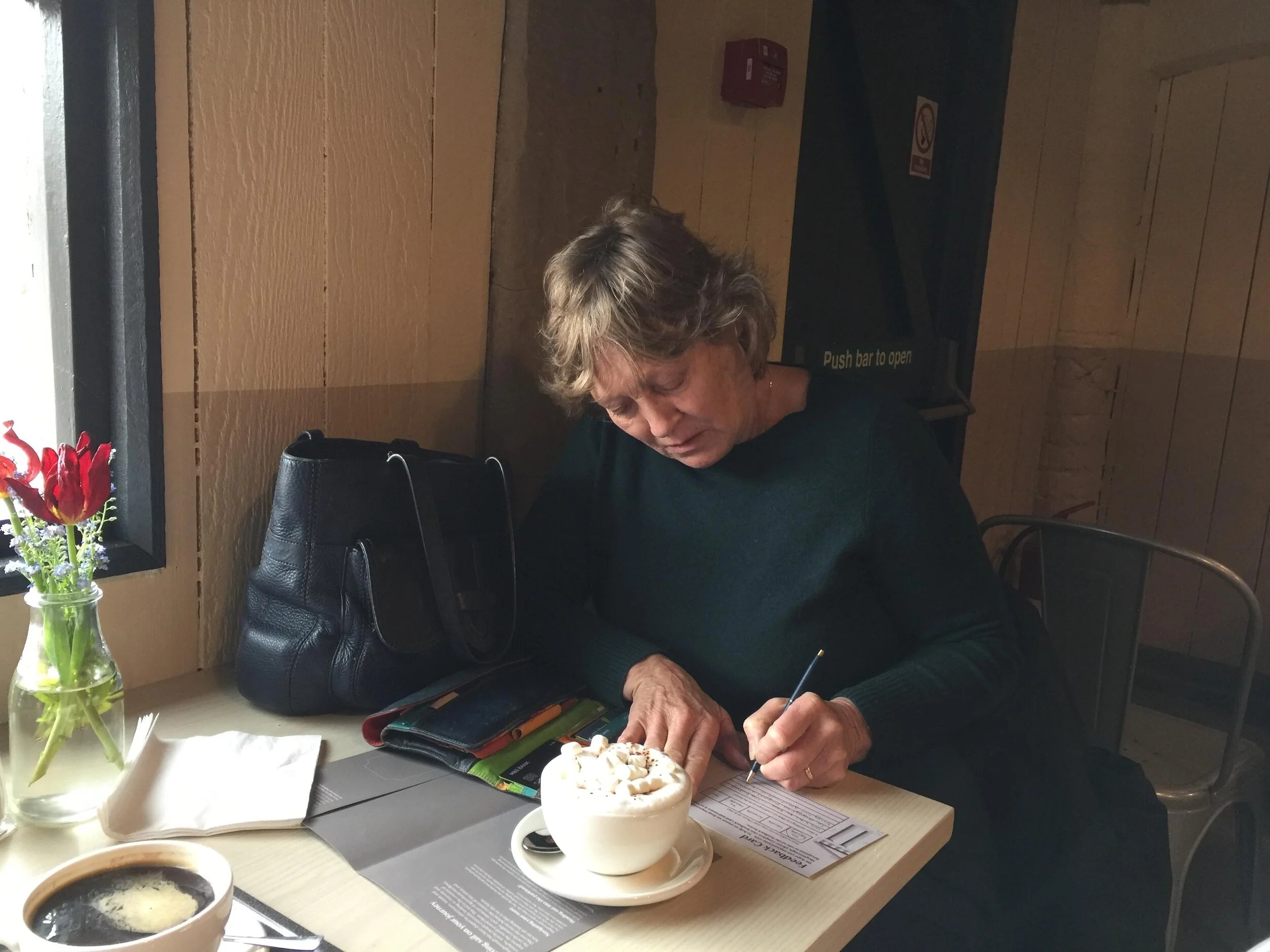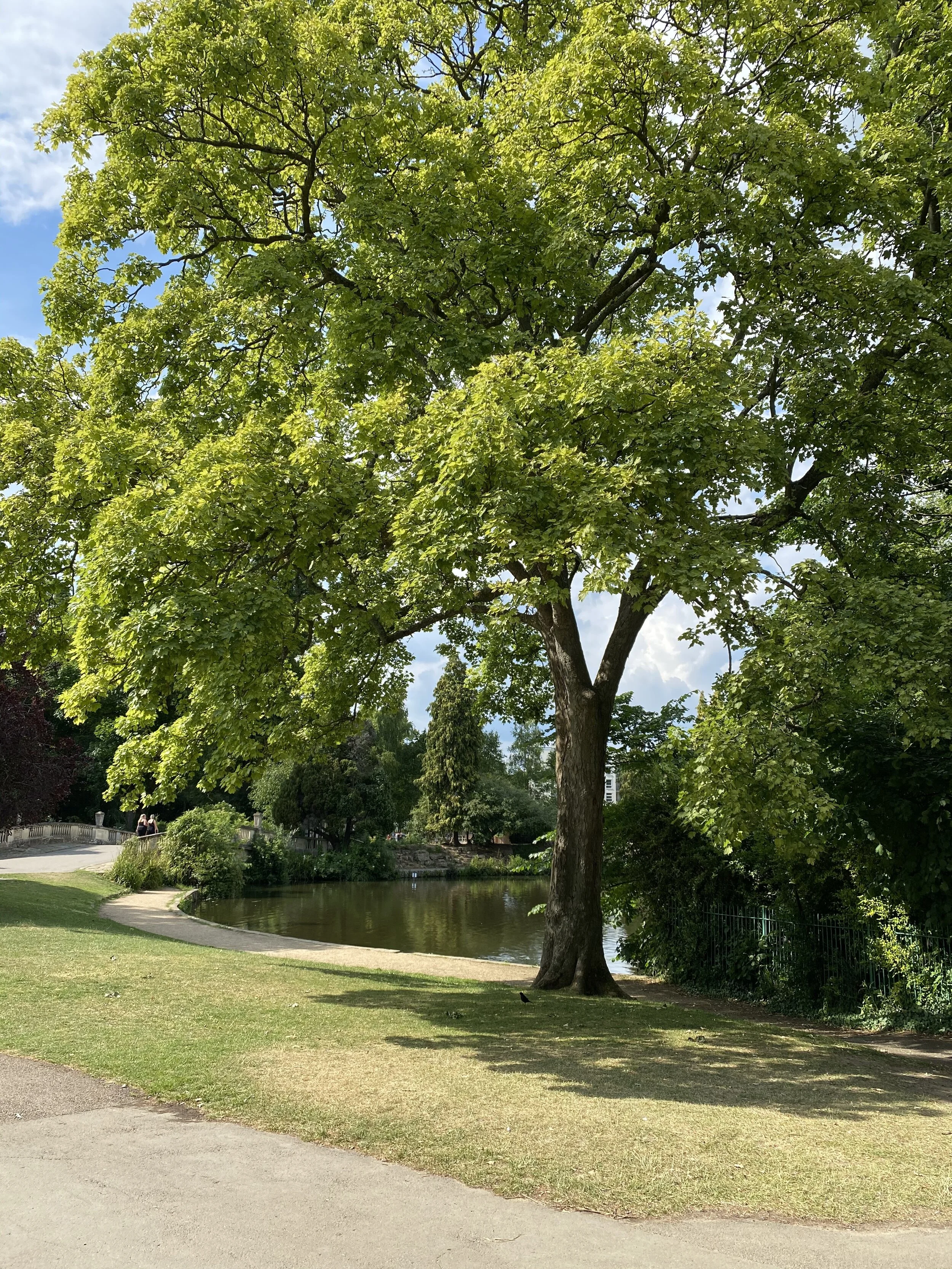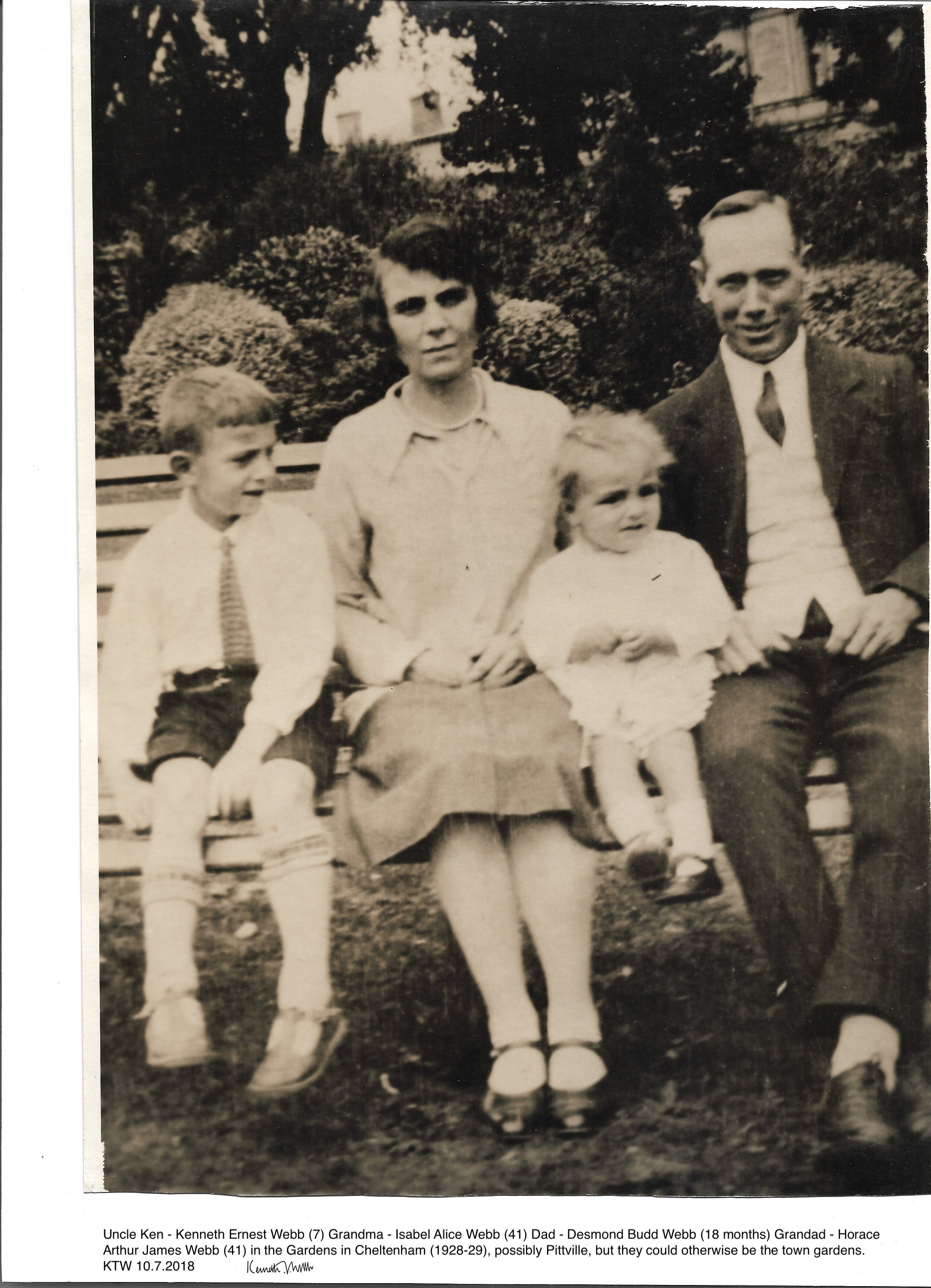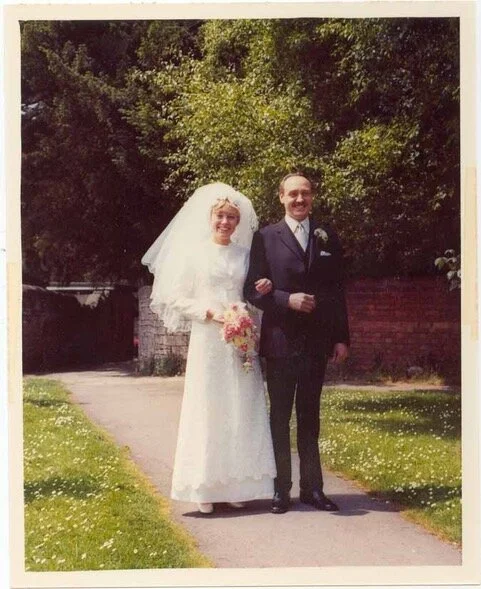WßD ~ Chapter 17 : Interlude (Revised Edition)
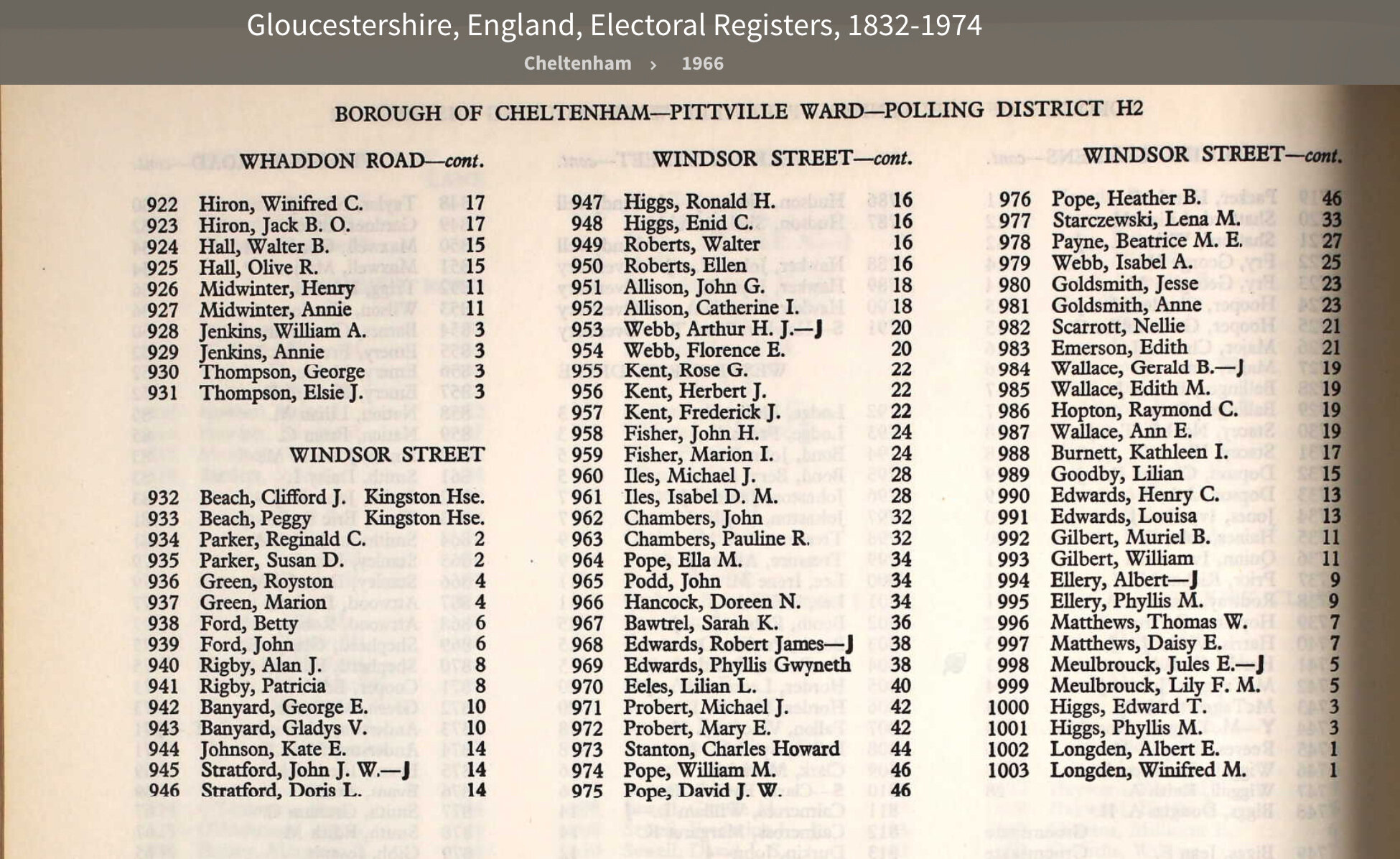
Windsor Street Days
Chapter Seventeen
Interlude
Part One
IT IS A PRIVILEGE to write my family’s story, and the unexpected dimension upon discovering my father’s typed manuscript in one of my discarded burgundy briefcases that Dad enjoyed giving new life to, along with my mother’s handwritten memories in 2012 increases this awareness, because it means Dad and Mum are able to give a contemporaneous account of their early years.
That manuscript closed with Chapter Fifteen.
It can take a lifetime for the facts of a situation to emerge; sometimes it is necessary to consider the sensitivity of others who have, through no choice, found themselves walking a different path to that which is regarded as ‘normal’, but which they have, in their own sphere, enjoyed as of right.
So-called “inside knowledge” is best kept to oneself, for as always, rudimentary facts lead to that wretched universal conundrum as old as human nature itself - two plus two equals five.
That is an end to the matter. I write this at a moment when people like me are not having an easy time in Poland following the elections in July 2020. And for that reason alone, I say now, thank God Almighty, we are not part of the European Union.
Part Two
On an icy but cloudless morning on Saturday, January 15, 1966, at around 6.30am, everything stopped.
I awoke that morning, excited that I was going to Number Twenty-Five for the day on my brand-new Raleigh Viking Popular with - wow - 3-speed Sturmy Archer, my birthday gift ten months earlier. I arrived in Windsor Street at around 9am. It was cold, but I had gloves on, and long trousers. I loved my bike. Life was good. The day was fresh, and everything was in order.
As I turned into Windsor Street, two ladies were talking at the front gate of Number Twenty.
Oh no! It’s Aunt Bette and Mrs Kent from Number Twenty-Two! I remember thinking, now just go carefully, don’t do anything stupid, park the bike on the front step at Grandma’s. So far, so good.
Grandma will be making a pot of tea, or we’d have Camp Coffee and Judy will be on the other side of the front door waiting. I reached out to the round brown door handle, and as I turned it, suddenly from across the street … one syllable, very loud … my name, and with an authority that made it clear … do not open the door but cross the road!
It took me aback.
At the kerb, still non-plussed, I looked right, left and right again, for Windsor Street was now a through road to the new Cleevemount estate. I remember feeling awkward, as thirteen-year-olds often do.
Good morning, Aunt Bette. Good morning, Mrs Kent.
Good morning, Ken, dear, I’ll catch you later Bette …
Yes, I’ll pop round Rose.
The Kents were very close family friends, Mr Kent - Herbie - being a taxi driver, which meant that the Kents had, throughout the war, had a telephone, and of course, the only car in the street. When Ken was able to obtain a leave pass for a flying visit, inevitably, Mrs Kent received the call and would hot-foot across to her friends Isabel and Horace. Des also grew up with their sons Fred and Jim. And this was the case for most of the families in Windsor Street. The Kents, in a way, held the street together. And I like that recollection. It quite warms me, just recalling Mrs Kent, and Mr Kent and their sons. I could never work out why they seemed to enjoy saying ‘Ken’, as if they knew ‘from of old’ but I realise now that I was the link to a good family friend, one who had grown up with them across the street from Number Twenty-Five.
Part Three
Ken let’s go inside. I want you to be brave, as I have some bad news. And Aunt Bette stood to the side of the front gate so I could pass by.
Go into the front room Ken.
A very pleasant room, minimalist, and art deco. Rarely entered. A figurine - one in each room - always fascinated me. It was a happy house, it was Uncle Arthur’s house, and since Grandad had died, Uncle was, next to Grandma, the head of the family. I wondered where Uncle was. His car wasn’t outside. Looking back, I’m presuming he had already driven over to Benhall to inform his brother, Des.
Now Ken, you’re almost 13 now, so I know you’ll be brave, but I have to tell you that Grandma Webb died this morning very peacefully in her sleep. Now I know that you’re brave, but it’s quite in order for you to cry if you want to. I can give you a hankie if you haven’t got one. I, of course, have not cried. I said to myself a long time ago that when this moment came, I would be sad, but I would not cry.
And I remember Aunt Bette then making some curious remark … now lost to time … but the only part that hit home like a sledgehammer was that Grandma was suddenly relegated to ‘Mrs Webb’ and learning that “Mrs Webb and I haven’t always seen eye to eye.”
Sitting there on the settee, Aunt Bette standing by the window, she had made the announcement as she walked from the door to the window across the fireplace … all one sweeping movement, and I remember her skirt, down to the shins, very elegant. I was confused. I wanted to say, …but Aunt Bette, you always call Grandma Mum. Like Mum does.
Today, I would say that my ship had been completely upturned, come up briefly, and then been pushed back down by Nature to ensure its disappearance was permanent.
My elder sister has reminded me that jealousy was afoot, as our aunt knew that our mother (Nancy) and our grandmother had a very close relationship.
The rest of that day remains a blank.
But it is also time to straighten records and family perspectives.
Part Four
We all came to realise, over the years, that Dad was very vulnerable dealing with bereavement. A modern phrase I often hear of this distress is that he or she ‘can’t handle it.’ That’s harsh, but reasonably accurate.
We did not have a telephone at home in Benhall, but Carol too remembers that morning vividly.
Carol was hoovering the bedroom - part of Saturday family chores - “and Dad walked in, just stood there, then said ‘Grandma has died’, and walked straight back out again.
I was in a state of shock! And I remember continuing to hoover, not smoothly, erratic, angry. It was automatic, I didn’t know what else to do. I was traumatised and distraught by what Dad had just announced. The trouble is, over the years, that terrible event was misreported within the family, so that I appeared to be just carrying on hoovering, as normal, a person without feeling.”
This is a paraphrase of Carol’s reminiscence last month (July 2020), and it was yet another piece of family jigsaw being put in place. It also took me aback, for I was unaware of this.
Part Five
Bereavement is subjective. We know this; and my work as a probate lawyer has emphasised this. And this is very important to understand. The five stages of bereavement are fluid, and their timespan is a lifetime, not, as some say, a few months or a couple of years at most. No. Bereavement is handled over the course of a lifetime. And those five stages are also quite capable of moving themselves around.
If I picture death as a railway locomotive, death pulls five carriages behind it:
denial
anger
bargaining
depression
acceptance
And these do not fit neatly onto timelines. They interplay.
As each carriage is unhooked and placed at the rear, suddenly, any one of them will become coach No 1 again. First Class! Yes, causing first class mayhem three, four and five decades, or more, on.
Entirely demonstrative … this is , in fact, the Irk Valley Train Disaster, Manchester
The London and North Eastern Railway locomotive Mallard Number 4468, a Class A4 4-6-2 Pacific steam locomotive built at Doncaster Works, England in 1938. It held the world speed record for steam locomotives at 126 mph (203 km/h) in 1938.
Why do I mention this?
Because I’m very aware that Carol had a deep and loving relationship with her paternal grandmother; she was 16, a young woman, and Grandma made sure she had separate relationships with all three of us, Carol, Vanessa, and me. That is how it should be.
And I am only too aware of the depth of Carol’s love and affection over a lifetime. Indeed, of both my sisters. I can draw upon countless examples, as well as the equal number relating to me, to my well-being and welfare. But as a family we must accept - as with every family - that dealing with the loss of someone is a unique happening; not just one of many. Each loss is the dismemberment - as in this case - of an intimate relationship that cannot be replaced.
Carol … a wonderful moment, for it exactly captures how I used to see Dad working at Cheltenham Cenral Police Station when I too was stationed. Carol is a superb administrator, as well as a Landscape Gardener, and a registered child-minder, and a wonderful way with animals of all kinds and varieties. Working with Land, Tundra, Fauna and Flora - that most definitely was learned from both her Grandfathers … both had allotments, and Carol’s early years were there, in the soil, in amongst the cabbages, planting, seeing the growth and reaping the harvest, learning about Nature. Wonderful … and ALL of us have benefitted from this.
A page fron the 1966 Gloucestershire, England, Electoral Registers, 1832-1974
Cheltenham 1966
Borough of Cheltenham - Pittville Ward - Polling District H2
Part Six
This is family life. We overcome, and quietly move on, each in his or her own way. We also remember the good times, we learn from them, for they strengthen the foundations of life today. Likewise, the less happy memories. They are those irksome lessons but which, we later realise, were necessary.
Part Seven
And whilst 1966 marks the physical attachment to Windsor Street coming to an end, with the sale of both Twenty-Five and Twenty Windsor Street - with Arthur and Bette moving up the newly extended road, 800 yards to their home in Cleevemount - Windsor Street is the bedrock of my family, and my own family life, and my family name of which I am intensely proud, even more so, as I am the last to bear the surname Webb.
This came home to me when, needing to obtain a copy of my birth certificate when I was up in Liverpool several years ago, I was thrilled to find that my address is recorded as 20 Windsor Street. Wonderful.
Part Eight
The roots of trees travel along the sub-surface and also deep down vertically into the rock strata below. So too, do the roots of family. Often, the roots are forgotten about, but they’re there none-the-less, and we’d know very quickly if the roots are severed.
And I realise that this is why I spend so much time in Pittville.
Pittville is where I grew up; it is where I returned aged 15, when our parents purchased the house on the Mount - Pittville Mount Park - that would become the family home for half a century, and the latch of the door I turned for the last time, the last Webb, on Friday January 27, 2017, turned round, looked across at “our lake” “our park” for one last time, and drove away; delivering the keys to the estate agent at 107 Promenade. Ironically, 107 were the offices - along with Clarence House at 133, opposite the Queen’s Hotel - of Watterson Todman Solicitors, the firm I had worked with, and solicitors who, over seven years, took me through 18 law examinations to qualify as a lawyer in all disciplines, but specialising in probate, trusts, succession law and attorneyship.
Everything, in every family, if we take the time to look back, pause, consider, and reflect, gives our timeline of history; and very quickly we see patterns emerging, initially coincidences, but as time passes and we grow wiser, we see are not coincidences at all, but synchronicity, a more sophisticated mechanism. I set great store by that wonderful dictum by scientists:
There is no such thing as coincidence; coincidence is the product of the lazy scientist’s mind
This is why the family story will continue under this title Windsor Street Days.
23 April 2024
All Rights Reserved
© 2024 Kenneth Thomas Webb
First written August 10, 2020
Last published May 15, 2022
Nancy Webb with her eldest daughter Carol on her 86th birthday October 6th, 2014
Pittville Mount Park East side of Evesham Road, the small lake below Pittville Pump Room in August 2020
Ken Webb is a writer and proofreader. His website, kennwebb.com, showcases his work as a writer, blogger and podcaster, resting on his successive careers as a police officer, progressing to a junior lawyer in succession and trusts as a Fellow of the Institute of Legal Executives, a retired officer with the Royal Air Force Volunteer Reserve, and latterly, for three years, the owner and editor of two lifestyle magazines in Liverpool.
He also just handed over a successful two year chairmanship in Gloucestershire with Cheltenham Regency Probus.
Pandemic aside, he spends his time equally between his city, Liverpool, and the county of his birth, Gloucestershire.
In this fast-paced present age, proof-reading is essential. And this skill also occasionally leads to copy-editing writers’ manuscripts for submission to publishers and also student and post graduate dissertations.



